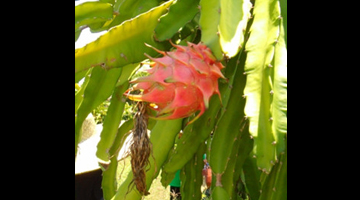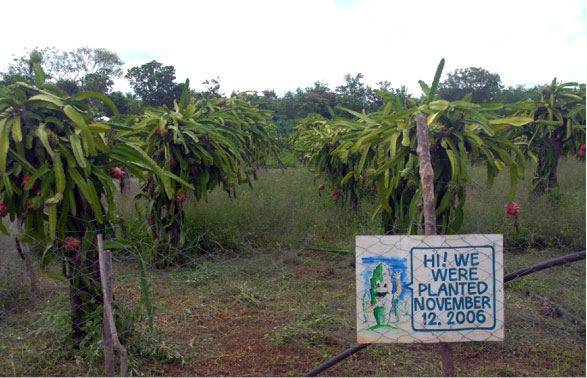 It is bulbous, red, and scaly all over. It tastes best when chilled and is a great cure for constipation.
It is bulbous, red, and scaly all over. It tastes best when chilled and is a great cure for constipation.
The dragon fruit, also called pitaya or pitahaya, is now becoming one of the major products of the north, specifically the Ilocos Region.
In response to the sudden interest of the people in the fruit and in the opportunities it could offer, the Ilocos Agriculture and Resources Research and Development Consortium in collaboration with the Kailukuan Saniata Cooperative, Department of Education, the Provincial Government of Ilocos Norte, and PCARRD organized the first ever Saniata Dragon Fruit Festival on July 5-8.
The event aimed to enhance the interest of the people and industry for dragon fruit, which is also called “saniata” by the Ilocanos. It also aimed to promote this emerging fruit to the rest of the Philippines with the help of the local and national media.
Local leaders saw the festival as an opportunity to make Ilocos Norte the dragon fruit capital of the Philippines. Governor Imee Marcos in her speech said: “Think big, think global. Ilocos Norte, dragon fruit capital of the world! O di ba bongga”? (Is it not glamorous?)
PCARRD’s contribution
Helping the province realize its vision is PCARRD through the establishment of a Science and Technology-based Farm (STBF) on organic dragon fruit production at the Rare Eagles Forest Marine and Agricultural Development (REFMAD) Farm in Barangay Paayas, Burgos, Ilocos Norte. PCARRD Executive Director Patricio S. Faylon underscored the STBF as the Council’s contribution to the growing dragon fruit industry in Ilocos Norte during the festival’s techno forum.
 Aside from the forum, the festival was highlighted with the conduct of press conferences, cookfest, essay writing contest, photojournalism contest, and an awarding ceremony to acknowledge those that made a difference in the dragon fruit industry of Ilocos Norte.
Aside from the forum, the festival was highlighted with the conduct of press conferences, cookfest, essay writing contest, photojournalism contest, and an awarding ceremony to acknowledge those that made a difference in the dragon fruit industry of Ilocos Norte.
PCARRD initiated the press conferences including the Technology to People (T2P) media blitz held at the REFMAD Farm on July 6. T2P is the Council’s technology diffusion strategy involving the media. Mrs. Edita Dacuycuy and her technologies on dragon fruit production and processing were the foci of the activity.
Incidentally, Dacuycuy, owner of REFMAD Farm and one of the earliest growers of the plant in Ilocos, has reaped enormous benefits. In 2009, REFMAD Farm posted a net income of more than P21 million from dragon fruit production and is continuously growing. Dacuycuy has also been bestowed with numerous awards including the Gawad Saka for High Value Commercial Crops at the Malacañang Palace in May 2011.
Print, broadcast, television, and electronic media correspondents from Business Mirror, Greenfields, Manila Bulletin, Manila Newsweek, Dyaryong Tagalog, DZRB, ABS-CBN, NBN 4’s “Mag-Agri Tayo”, and GMA 7’s “Kapuso mo, Jessica Soho” covered the event.
